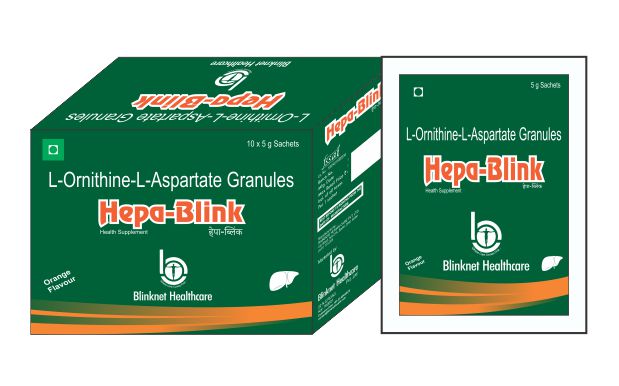Sachet Presentation
Each Sachet of 5 g Contains:L-Ornithine L-Aspartate 3 g
L-Ornithine L-Aspartate belongs to Cholagogues and hepatic class. L-Ornithine L-aspartate (LOLA), a stable salt of ornithine and aspartic acid, has been used in the treatment of cirrhosis. It is also used for the treatment of high ammonia levels or severe liver impairment. Ornithine and aspartate are amino acids which are important in the biochemical pathways that detoxify ammonia.
Indications
As a supportive therapy during mild to moderate liver disease such as: jaundice, acute Hepatitis (viral/ non-viral, drug induced), chronic hepatitis as adjuvant therapy with the tuberculosis and cytotoxic drugs.Pharmacology
Ornithine and aspartate are amino acids which are important in the biochemical pathways that detoxify ammonia. In cirrhosis, impaired hepatic metabolism and blood flow lead to raised serum and CNS ammonia concentrations. Abnormal ammonia metabolism and the resulting accumulation of toxic ammonia is one of several possible mechanisms for hepatic encephalopathy. Ornithine and aspartate are substrates in metabolising ammonia to urea and glutamine, respectively.Pharmacodynamics Properties
Ornithine is an initial substance which starts the detoxification cycle or urea cycle,by activating the urea cycle enzymes, carbamyl tranferase and synthetase.which converts toxic ammonia into toxic urea helps the diseased liver to perform normal functions smoothly.Thus promotes detoxification means,lower elevated level of ammonia in blood (hyperammonemia) and improved the subjective symptoms of nausea and vomiting.Aspartate an essential component of citric acid cycle,which liberates energy(ATP) helps registration of damaged cells.Thus restore normal metabolic function of liver improves the general symptoms of weakness.In addition aspartate is itself an excitatory neurotransmitter and helps in maintaining the glutamate concentration in the brain.Contraindications
Contraindicated in patients with elevated level of liver enzymes.Warning & Precautions
In patients with severe renal insufficiency, blood urea and serum creatinine must be monitored regularly, serum creatinine value exceeding 3 gm/ml is regarded as a reference value. Caution needed for pregnant and breastfeeding women.Pregnancy & Breast Feeding
There is not enough reliable information about the safety of taking ornithine if you are pregnant or breast-feeding. Stay on the safe side and avoid use.Undesirable Effects
Transient nausea and vomiting.Disclaimer: The data uploaded is made from content already available on internet.The company holds no right of it and is not responsible for any wrong information.
Know About new DCGI Approved Products
Copyright © by Alaina Pharma. All rights reserved.
Created by Alaina Pharma
